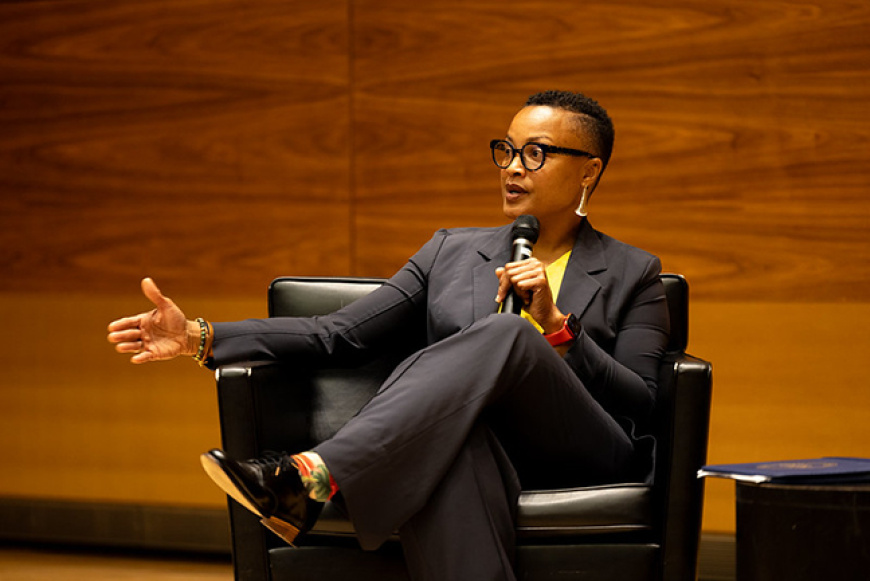
 back to all news
back to all news
Shalanda Baker: ‘Justice needs to be at the core of the clean energy transition’

We are in an “extraordinary moment” to create an equitable clean energy future. And Michigan, like other states, is an “essential part” of bringing forth that future, Shalanda Baker, director of the Office of Economic Impact and Diversity at the U.S. Department of Energy, told a U-M audience on September 27.
Baker cited statistics about how Michigan is already meeting the energy transition. As of 2021, she noted, there were over 390,000 Michigan workers employed in the energy sector. In the Detroit metro area, over 70% of the electric power workforce is in wind, solar, and hydroelectric, and over 40,000 workers are employed in energy efficiency. She also called attention to the state’s “ambitious goal” of becoming carbon neutral by 2050.
“But like many other states, there’s still room to ensure that the most disadvantaged here in the state can fully benefit from and participate in this energy transition,” Baker said.
About 400 participants attended the talk, “In Conversation with Shalanda Baker: Equity and Justice in the Energy Transition,” at the Ross School of Business. It was sponsored by the School for Environment and Sustainability and moderated by Lisa Eichler Clark, U-M’s director of climate action engagement, who introduced Baker and led an audience Q&A session.
Prior to joining the Office of Economic Impact and Diversity, Baker served as the first-ever deputy director for energy justice. Before that, she was a professor of law, public policy and urban affairs at Northeastern University. The author of numerous articles, book chapters and essays on renewable energy law, energy justice, energy policy and renewable energy development, Baker received a Fulbright-Garcia-Robles research fellowship to study climate change, energy policy and Indigenous rights in Mexico.
During her talk, Baker posed three questions to the audience: Is justice possible in this transition? Are freedom and liberation possible through the transition of our energy system? And how do we avoid the mistakes of the past when it comes to communities disproportionately bearing the cost of the energy system while receiving few of its benefits?
Energy justice had been part of Baker’s story long before she knew what the phrase meant, she said. Her father grew up in Port Arthur, Texas, part of the Golden Triangle, “which is the birthplace and epicenter of the modern fuel industry,” Baker said, “and a place that is so toxic that families are still asked to shelter in place due to the illegal emissions and hazardous materials released into the air.”
Naming Highland Park, Detroit and Ann Arbor as examples of “vibrant” Michigan communities that are advocating for clean energy initiatives, Baker told attendees that while change is already underway in our state, it’s imperative that we work together and “stay vigilant” to ensure that justice is the foundation of the energy transition.
“We have to continue to reckon every single day with structural racism and structural inequality and the ways in which those things are baked into the energy system,” Baker said. “If we don’t reckon with injustice in our march to tackle climate change, we will embed injustice into our energy transition. If we don’t do that hard work, the new system will be built on top of all that inequality and injustice.”
During the Q&A session, Baker addressed questions about the impact of municipal utilities on equity, the inclusion of resource-rich countries in the transition, and the balance between food and energy production. She emphasized the importance of community involvement, restorative justice and the need for new business models that prioritize shared economic benefits.
Watch the full event below.

